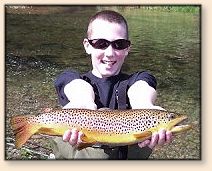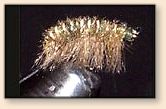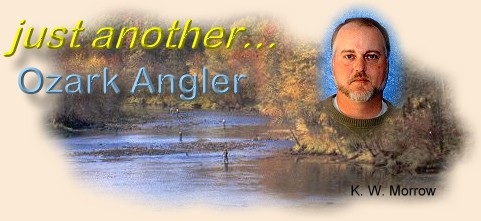 I recently had an opportunity to fish with the
"new guy" on Lake Taneycomo, Brett Rader of
Chartered Waters guide service and fly shop.
Just a day or two prior, Brett had an article
published on a fly-fishing website about stalking
trophy trout on upper Taneycomo. I wanted to put
his strategy to the test. When Brett asked me how
I wanted to fish I said, "Treat me just like a
client who called and said he wanted to catch a
real trophy." And that is how we proceeded.
I recently had an opportunity to fish with the
"new guy" on Lake Taneycomo, Brett Rader of
Chartered Waters guide service and fly shop.
Just a day or two prior, Brett had an article
published on a fly-fishing website about stalking
trophy trout on upper Taneycomo. I wanted to put
his strategy to the test. When Brett asked me how
I wanted to fish I said, "Treat me just like a
client who called and said he wanted to catch a
real trophy." And that is how we proceeded.

Rader's basic philosophy is to sight fish to the
often-overlooked trout holding along the banks
of the tailwater stream section of Lake Taneycomo
using scud imitations of his own creation. The
flies are very simply tied and unadorned scuds
tied primarily from ginger or olive (seen at right).
He uses no scud back, wire, bead heads, etc. The
other go-to pattern of Brett's is a fly he calls
the G-bug (seen below), which resembles a size 20
Woolly Bugger with a very short tail...also in ginger
or olive. He is a strong proponent of fluorocarbon
leaders and tippet in 6x and 7x for sight fishing.
He prefers to fish without weight and using ½ of a
Palsa foam indicator about 1.5 feet to 2 feet up the
leader in one foot of slow to still water.
 When the dam generators lay dormant, Rader takes his
clients wading below the dam and introduces them to
his own version of sight fishing. Preferring the
still water along the banks, Rader employs an unusual
presentation technique that requires some very delicate
roll casting and a good pair of polarized glasses.
He teaches clients to focus their attention on
moving trout. When they spot their prey, he has
them cast along the line of the fish's approach
about 10' to 15' ahead of the fish. It is important
not to false cast and to be as accurate as possible,
laying the flies out fully extended below the indicator.
Casting distances are very short. The fly(s) is allowed
to sink under its own weight in the hopes that the
approaching fish will scoop it up as he passes. Once
the fly hits bottom, the odds of a take dramatically
decrease.
When the dam generators lay dormant, Rader takes his
clients wading below the dam and introduces them to
his own version of sight fishing. Preferring the
still water along the banks, Rader employs an unusual
presentation technique that requires some very delicate
roll casting and a good pair of polarized glasses.
He teaches clients to focus their attention on
moving trout. When they spot their prey, he has
them cast along the line of the fish's approach
about 10' to 15' ahead of the fish. It is important
not to false cast and to be as accurate as possible,
laying the flies out fully extended below the indicator.
Casting distances are very short. The fly(s) is allowed
to sink under its own weight in the hopes that the
approaching fish will scoop it up as he passes. Once
the fly hits bottom, the odds of a take dramatically
decrease.
Anglers with good polarized glasses can quite easily
watch the fish for any telltale signs that they have
seen and are keying on Rader's offerings. And Rader
himself offers a play-by-play summary of what is
going on. But the angler's primary focus must be
on the foam indicator...watching for the slightest
irregular motion indicating that a fish has taken
in the fly. Either on command from Brett, or on
the motion of the indicator, a very quick hook set
is executed in the hope of a solid hook up. The
take is often barely perceptible at the indicator,
but angler's can also watch for the tell-tale flash
of white at the fish's mouth as it opens up to suck
in the fly. I hooked up with several fish when Brett
hadn't called for it and there was no indicator motion,
but I had seen the fish open his mouth in the vicinity
of the fly. There were also several successful hook
ups resulting from his instruction when I neither saw
the fish open its mouth nor saw motion on the indicator.
This was my first experience with two pairs of
experienced eyes working in tandem while sight
fishing. It proved to be an effective combination.
When the fly has settled to the bottom (which usually
takes about 10 seconds), Brett would have me pick up
and cast again...even if only to the exact same spot.
The trout take the fly as it is dropping. There is
no dead drifting, no mending line upstream to reduce
the drag of the current, no long distance casting,
or strip retrieves in the Rader technique. It is
very simple and fundamental nymphing. One does not
need a lot of casting skills to make it work effectively.
And even the least expensive fly rod and reel combination
is sufficient to the task at hand. As such, his approach
is very appropriate to his principal clientele: new fly
anglers who are looking for some quality instruction in
addition to landing a few fish.
"A few fish..." Ha! I fished with Brett for about 3
hours. We covered a couple hundred yards of heavily
traveled bank...downstream and back. And we landed
well over a dozen trout, the largest measuring about
18" (pictured below).
 Brett Rader is a very personable and knowledgeable
fishing guide. He guides fly, spin, and bait
fishing trips for trout on Lake Taneycomo daily.
His company, Chartered Waters also runs a pro
shop and on-line fly shop in Hollister, MO, that
is located on the South shore of Lake Taneycomo.
Chartered Waters also operates a Lowe 180 fishing
boat for drift fishing the lower lake, or the
upper tailwater on generation.
Brett Rader is a very personable and knowledgeable
fishing guide. He guides fly, spin, and bait
fishing trips for trout on Lake Taneycomo daily.
His company, Chartered Waters also runs a pro
shop and on-line fly shop in Hollister, MO, that
is located on the South shore of Lake Taneycomo.
Chartered Waters also operates a Lowe 180 fishing
boat for drift fishing the lower lake, or the
upper tailwater on generation.
Brett Rader's Chartered Waters may be the "new
kid on the block," but this new kid is a welcome
addition. Brett is very competent, personable,
and well equipped. Chartered Waters offers a
"catch fish or it's free" guarantee, hoping to
encourage new anglers to give them a try. So
far, he hasn't had to refund anyone's money. To
contact Chartered Waters, visit them on-line at
www.CharteredWaters.com or call toll free at
1-866-362-1928. ~ Ken
About Ken:
Ken graduated from Southern Methodist University
in 1988, and spent the next several years serving
in the United States Navy as an intelligence analyst
and Russian Language translator. He is a veteran
of Desert Shield and Desert Storm. Leaving the
nation's service in 1993.
Ken is also a published outdoor writer and historian,
having penned articles and stories that have appeared
in several national hunting publications like North
American Hunter magazine, on GunMuse.com, in regional
and local newspapers, and historical and literary
journals. He also provides hunting and dog training
seminars for Bass Pro Shops and other sporting goods
retailers nationwide and works with other outdoors
businesses and conservation organizations in the
fields of public relations, promotional marketing,
fund-raising, and advertising. He also is a partner
in Silver Mallard Properties, LLC. He currently
resides with his wife, Wilma, their Weimaraner,
Smoky Joe, and their Labrador Retriever, Jake, in
Branson, Missouri, where he founded the
Branson/Tri-Lakes Chapter of Ducks Unlimited in 1998.
|

 I recently had an opportunity to fish with the
"new guy" on Lake Taneycomo, Brett Rader of
Chartered Waters guide service and fly shop.
Just a day or two prior, Brett had an article
published on a fly-fishing website about stalking
trophy trout on upper Taneycomo. I wanted to put
his strategy to the test. When Brett asked me how
I wanted to fish I said, "Treat me just like a
client who called and said he wanted to catch a
real trophy." And that is how we proceeded.
I recently had an opportunity to fish with the
"new guy" on Lake Taneycomo, Brett Rader of
Chartered Waters guide service and fly shop.
Just a day or two prior, Brett had an article
published on a fly-fishing website about stalking
trophy trout on upper Taneycomo. I wanted to put
his strategy to the test. When Brett asked me how
I wanted to fish I said, "Treat me just like a
client who called and said he wanted to catch a
real trophy." And that is how we proceeded.

 When the dam generators lay dormant, Rader takes his
clients wading below the dam and introduces them to
his own version of sight fishing. Preferring the
still water along the banks, Rader employs an unusual
presentation technique that requires some very delicate
roll casting and a good pair of polarized glasses.
He teaches clients to focus their attention on
moving trout. When they spot their prey, he has
them cast along the line of the fish's approach
about 10' to 15' ahead of the fish. It is important
not to false cast and to be as accurate as possible,
laying the flies out fully extended below the indicator.
Casting distances are very short. The fly(s) is allowed
to sink under its own weight in the hopes that the
approaching fish will scoop it up as he passes. Once
the fly hits bottom, the odds of a take dramatically
decrease.
When the dam generators lay dormant, Rader takes his
clients wading below the dam and introduces them to
his own version of sight fishing. Preferring the
still water along the banks, Rader employs an unusual
presentation technique that requires some very delicate
roll casting and a good pair of polarized glasses.
He teaches clients to focus their attention on
moving trout. When they spot their prey, he has
them cast along the line of the fish's approach
about 10' to 15' ahead of the fish. It is important
not to false cast and to be as accurate as possible,
laying the flies out fully extended below the indicator.
Casting distances are very short. The fly(s) is allowed
to sink under its own weight in the hopes that the
approaching fish will scoop it up as he passes. Once
the fly hits bottom, the odds of a take dramatically
decrease. Brett Rader is a very personable and knowledgeable
fishing guide. He guides fly, spin, and bait
fishing trips for trout on Lake Taneycomo daily.
His company, Chartered Waters also runs a pro
shop and on-line fly shop in Hollister, MO, that
is located on the South shore of Lake Taneycomo.
Chartered Waters also operates a Lowe 180 fishing
boat for drift fishing the lower lake, or the
upper tailwater on generation.
Brett Rader is a very personable and knowledgeable
fishing guide. He guides fly, spin, and bait
fishing trips for trout on Lake Taneycomo daily.
His company, Chartered Waters also runs a pro
shop and on-line fly shop in Hollister, MO, that
is located on the South shore of Lake Taneycomo.
Chartered Waters also operates a Lowe 180 fishing
boat for drift fishing the lower lake, or the
upper tailwater on generation.